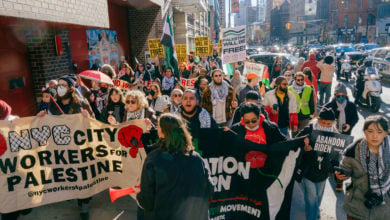On April 9, the Coalition of Immokalee Workers, the organization that represents farmworkers in Central Florida, won an agreement with McDonald’s—the world’s largest fast food chain. The agreement meets all the demands of the CIW. The victory comes after a two-year battle to improve the wages and working conditions for tomato pickers.

Nearly half of the tomatoes produced in the United States come from the Immokalee region of Florida.
The agreement stipulates that workers will get paid an extra penny per pound of tomatoes picked and shipped to McDonald’s. The increase will go directly to workers’ wages. On average, tomato pickers earn $10,000 a year. With this accord, wages have the potential to double, bringing farmworker wages closer to a living wage for the area.
The accord will affect up to 1,500 farmworkers.
A similar 2005 agreement with Yum! Brands—the corporation that owns Taco Bell—increased wages for 1,000 farmworkers.
The increase will function similar to the 2005 Yum! Brands agreement where workers will receive a separate check for tomatoes destined for McDonald’s. Tomatoes sold to other buyers are not part of this agreement and will continue to be paid at the former rate.
Fighting exploitation
Farmworkers who pick tomatoes for the fast food industry are among the most exploited workers in the United States. Outside of the 2005 Yum! Brands agreement, the per bucket piece rate has not increased in over 25 years.
Farmworkers are denied basic labor rights and, in some cases, conditions fall within statutes prohibiting modern-day slavery. There have been five cases of slavery operations in Florida prosecuted since 1997.
The accord addresses tomato picker work conditions. It will establish a code of conduct for growers that sell to McDonald’s. This code will include zero tolerance for forced labor and will provide farmworkers with a role in investigating worker complaints. There will also be a dispute resolution infrastructure. A third party will verify and mediate this system.
Most of Florida’s farmworkers are immigrants. Nearly half come from Mexico. Others are from Guatemala and Haiti. About 10 percent are African American.
The fast food industry represents tens of thousands of restaurants forcing down prices with tomato suppliers. This results in lower wages for the tomato pickers. Florida farmworkers pick tomatoes for over 13,000 McDonald’s alone.
Framework set by 2005 victory
After a four year boycott and media campaign, CIW won an agreement with Taco Bell’s Yum! Brands in 2005. The success of this campaign set the basis for the campaign against McDonald’s.
“Two years ago, our agreement with Yum! Brands marked the first step toward a distant dream of ensuring human rights for workers in Florida’s fields. Today, with McDonald’s, we have taken another major step toward a world where we as farmworkers can enjoy a fair wage and humane working conditions in exchange for the hard and essential work we do every day,” said Lucas Benitez, CIW co-founder and farmworker.
The McDonald’s accord came just days before the launching of the “Truth Tour.”
The Truth Tour was to converge in a “Parade for Fair Food, Real Rights, and Dignity” in downtown Chicago and a mass rally at McDonald’s nearby headquarters. Labor leaders, including AFL-CIO president John Sweeney, and religious figures were supporting the tour.
As the accord was won, the rally was turned into a celebration that featured members of the bands Rage Against the Machine and System of a Down.
“What it represents is a glimmer of hope that things can change across the country, with Burger King, Wal-Mart and Subway too,” said Julia Perkins, a CIW spokesperson.
A slap in the face of CIW’s demands, Miami-based Burger King recently announced it will send recruiters to the region to interview farmworkers for jobs in its franchises. The corporation also promised to build housing for workers. Neither of these announcements addresses the real issues of workers’ rights and living wages.
The struggle for farmworkers’ rights in the Immokalee region of Florida, however limited its demands, is part of the growing movement for immigrant rights in the United States.
The strategy of targeting those who profit most off of farmworker labor—the fast food giants—will help win immigrant and worker’s rights and build solidarity with workers in the fields and in service jobs behind the counter.





